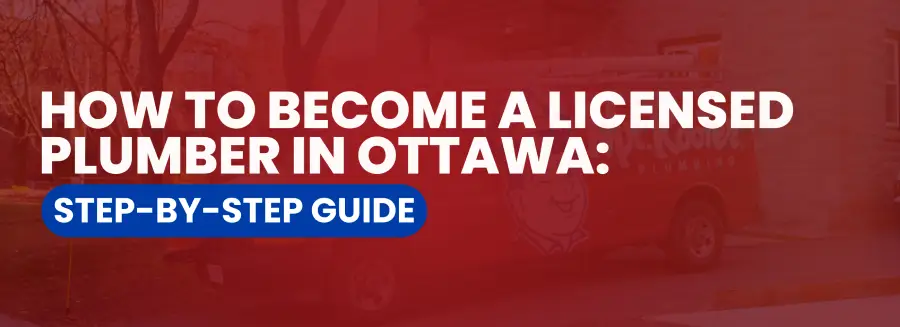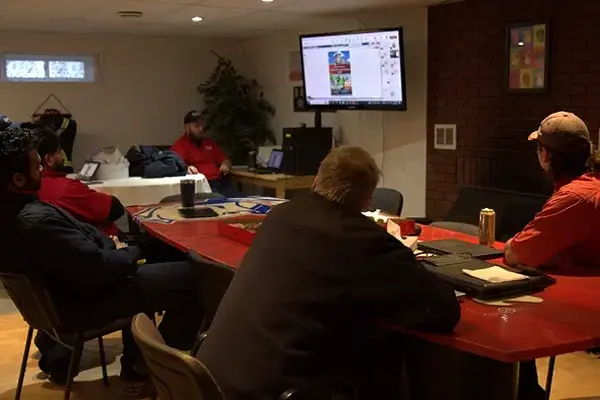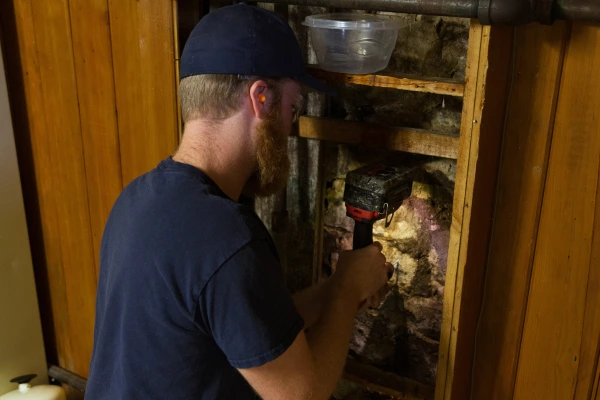
The first step to becoming a licensed plumber in Ottawa is securing an apprenticeship. This involves completing 9,000 hours of combined classroom education and on-site training with a licensed plumbing company. You'll need to find a company like Mr. Rooter that is willing to take you on as an apprentice, starting with reaching out to local plumbing firms.
As a licensed and seasoned plumber, Peter McGrath advises, "Search for local plumbing companies online, call or email them, and ask if they accept apprentices. Remember, government regulations require a 1:1 ratio of apprentices to licensed journeypersons so that some companies may have a waitlist."
Many also wonder if they can skip this step by enrolling in a plumbing school. The big answer is NO.
Plumbing is a mandated trade.
Plumbing is a regulated trade in Ottawa, which means that the government regulates and oversees the overall flow of how the plumbing license is acquired. They roll out guidelines and set up a three-way agreement between the apprentice, the company, and the government.
Schooling is only part of the 9,000 hours required. The government won't allow you to take the final exam without registering with a firm and completing the required hours. Of course, the government may still make exceptions. In instances where you get terminated from your apprenticeship, you can resume with a new company, but long gaps may impact the validity of your previous hours. However, as a general rule, continuous registration is needed. Formal education is required since a plumbing apprenticeship isn't just as simple as waking up and feeling like attending plumbing school.
Formal education is required.
While some plumbing skills can be learned on the job, formal education is critical to becoming a licensed plumber.
As Curtis McGrath, Greg Hughes, and Jeremy La Salle, veteran licensed plumbers, shared, "Many skills can be learned on the job, but any credentials would need to come from attending school." This includes a combination of classroom instruction and on-the-job training to qualify for the plumbing licensing exam. In Ottawa, apprentices attend government-approved schools, such as Algonquin College, La Cité Collégiale, or St. Lawrence College in Kingston.
Plumbing school isn't just about fixing leaks.
One of the biggest surprises for many plumbing students is the complexity of plumbing codes. To set the record straight, plumbing is not just about fixing leaks.
They'll explain that every installation must comply with strict regulations, and the sheer size of the plumbing codebook can be overwhelming. Plus, plumbing requires strong problem-solving skills and mathematical knowledge, as plumbers must calculate pipe sizes, pressure requirements, and system layouts. Another challenge is staying current with new technologies and materials as the plumbing industry constantly evolves.
3 Stages of the Apprenticeship Journey
In Ontario, plumbing apprenticeships follow a three-stage journey for in-classroom training in a College and a five-stage journey for on-the-job training. They start with hands-on, on-the-job training under a licensed plumber while logging 9,000 hours (1,800 hours per apprenticeship level 1 to 5).
After some experience and completing at least 1,800 hours, you will be sent an offer from Skilled Trades Ontario to attend college.

Basic Level 1 schooling lasts for two months. Pass an exam and return to work for on-the-job training. Every time you achieve 1800 hours, you advance in pay for the five-stage journey. From apprentice Level 1 to Level 2, there is a pay increase from 40% to 50% of a journeyperson's wage.
Next is Intermediate Level 2, for in-classroom training at a College. Here, you take on more complex tasks. It will also take another two months of schooling and exams.
At Advanced Level 3 for in-classroom training, you refine your skills, tackle specialized work, and complete the College Exam. When the in-classroom training is completed and passed, you will earn the title "Journeyperson-in-waiting." This level takes two months plus one week. The last week is a complete review to prepare you for the C of Q exam.
The final step? Passing the Certificate of Qualification (C of Q) exam.
As our licensed plumbers shared, one major challenge is that apprentices in Ontario learn the Ontario Plumbing Code, but the exam is based on the National Building Code. A change is in the works for this, and Colleges are now finally starting to teach from the National Code Book and not just the Ontario Code Book.
That being said, studying properly is essential. Many test-takers underestimate the difficulty and assume it only covers tasks they encounter daily. However, the exam includes many topics, some of which apprentices may not use often.
Passing the Certificate of Qualification (C of Q) Exam
Once you complete the required 9,000 hours of work and education, you must pass Skilled Trades Ontario's Certificate of Qualification (C of Q) exam.
The exam covers:
- Occupational skills
- Pipe preparation
- Drainage
- Waste systems
- Water distribution
- Fixture applications
- Low-pressure hydronic heating
- Maintenance/repair work
What Happens After You Pass?
So, you've passed the exam - what's next? Skilled Trades Ontario updates your public profile and sends out your Certificate of Qualification (C of Q) - though, heads up, it can take a few weeks to arrive.
The exam costs $150 + HST, and to keep your license active, there's an annual renewal fee of around $67.80 + tax. The good news? No extra renewal courses are needed for a standard plumbing license - pay the cost, and you're good to go.
But since you've already gone the extra mile and got your Red Seal Plumbing License, you can work anywhere in Canada except Quebec, where you'll need an extra CCQ license. Some provinces might also require additional licensing for specialized work like gas fitting, so it's always worth checking the local regulations.
But overall, having that Red Seal stamp on your certification gives you the freedom to take your skills across the country.
Why Certification Matters?
Plumbing without a license isn't just risky – it's expensive. Getting caught can lead to hefty fines, with first-time offenders facing up to $50,000, while corporations can be slapped with fines as high as $500,000. And it doesn't stop there. If you're caught again, the penalties grow significantly, with individuals facing fines up to $100,000 and corporations up to a staggering $1.5 million.
But it's not just about the penalties. As Greg Hughes, one of our seasoned plumbers, explained, "Unlicensed plumbers might lack the necessary training or experience, which can lead to serious issues like health risks, expensive repairs, and bigger problems down the line." A license ensures plumbers meet safety standards and follow building codes—critical to keeping work up to code and safe.
Finding Your Specialization in Plumbing
Not all plumbers do the same work - far from it. Ottawa has just one plumbing license, but what you do with it is up to you.

Service Plumbing
This company focuses on repairs and maintenance for residential and commercial properties, ensuring plumbing systems stay in top shape.
Construction Plumbing
This involves installing plumbing systems for new buildings and renovations, laying the groundwork for long-term reliability.
Specialized Work
This covers areas like backflow prevention testing, which requires additional certifications.
It's all about finding what fits your skills and interests. You're not locked into one path because there's always room to learn and grow as you gain experience.
Thus, becoming a licensed plumber in Ottawa is a fascinating field. It truly takes great dedication to obtain your license, but one thing's sure: It's worth the hard work.
As Peter McGrath said, "It's not just a title. Knowing you're ready to protect public health and keep communities running. It's about serving the nation."
Leap on your journey.
Start reaching out to plumbing firms and gaining hands-on experience. Ottawa needs skilled plumbers, and we never know—you could be the next success story we hear about!
If you'd like more information, contact Mr. Rooter Plumbing of Ottawa. We're more than happy to assist you with your plumbing needs!

